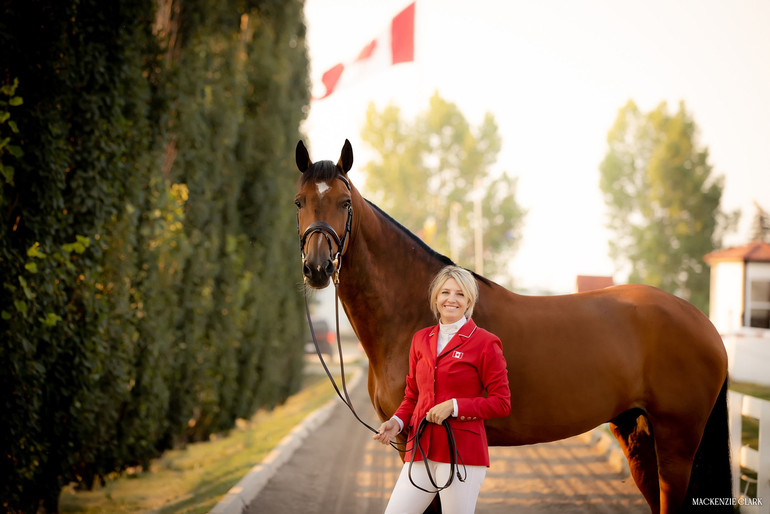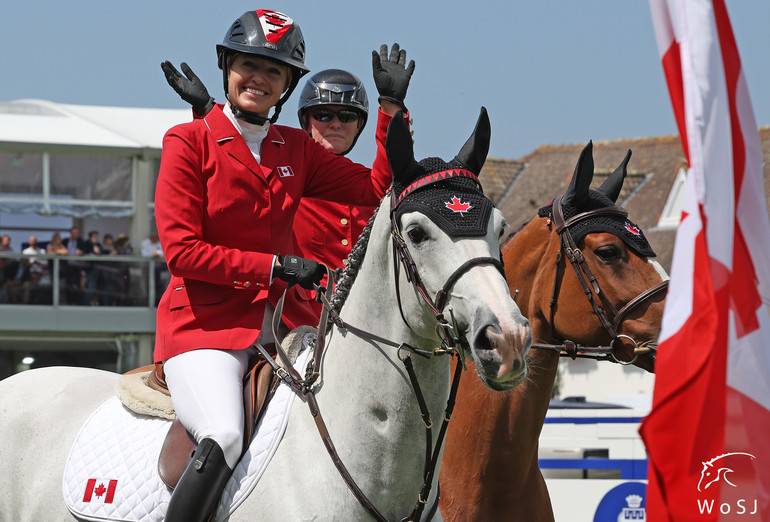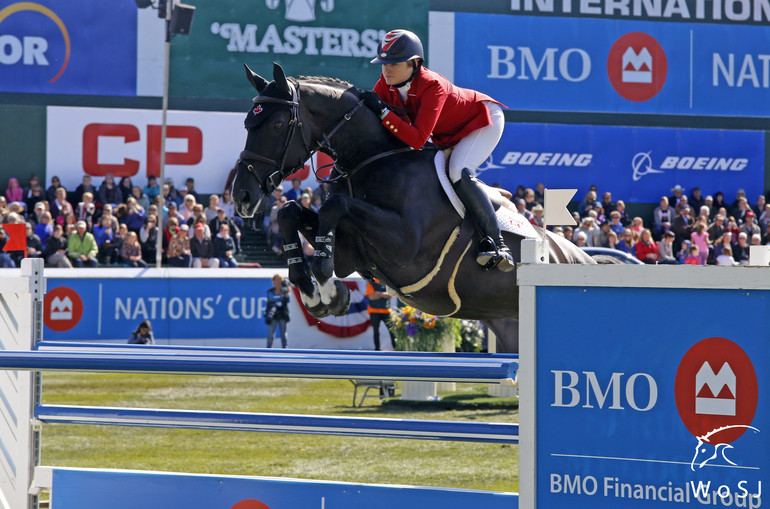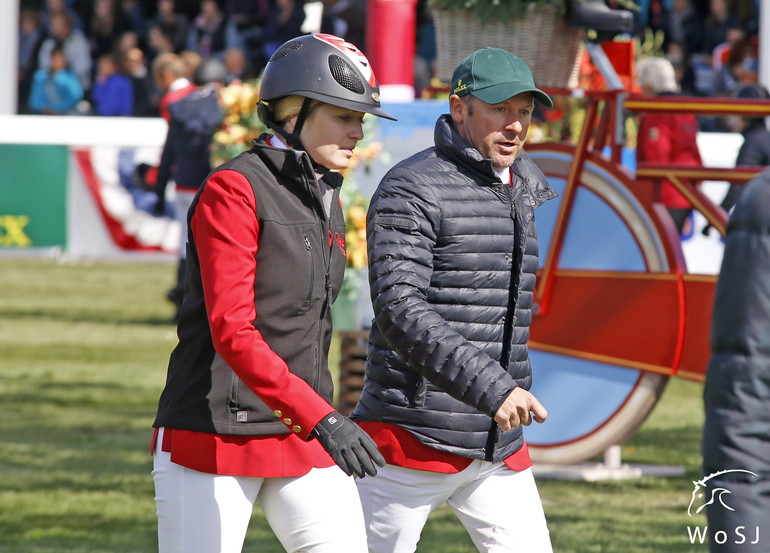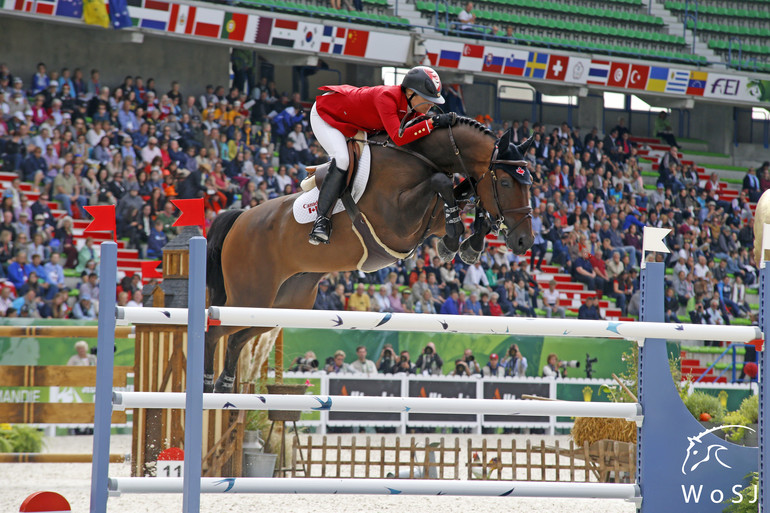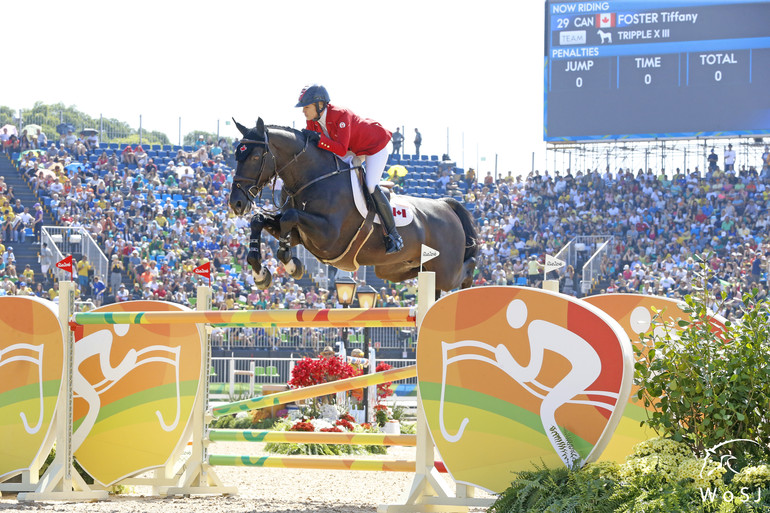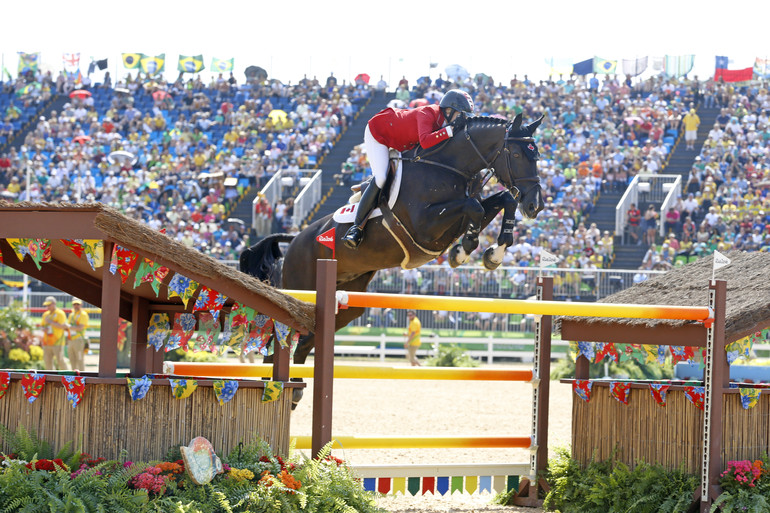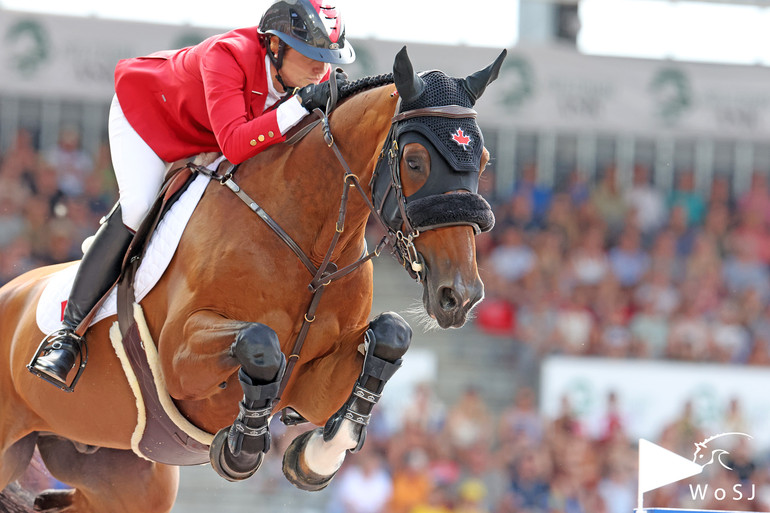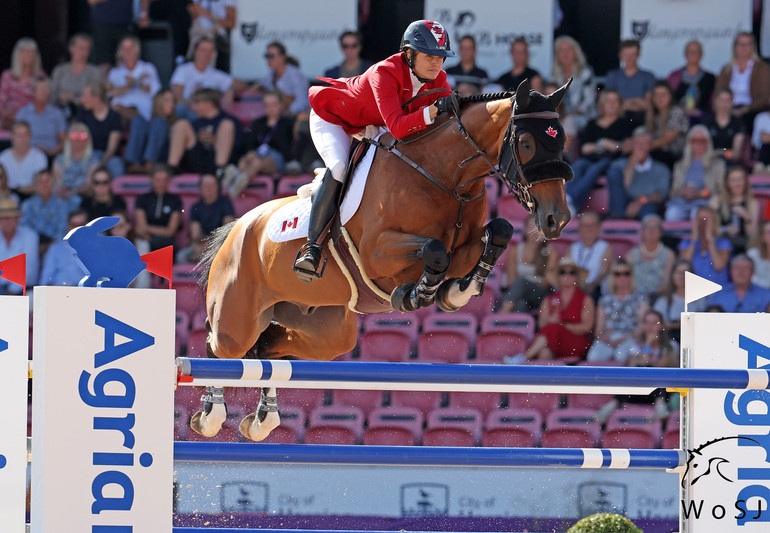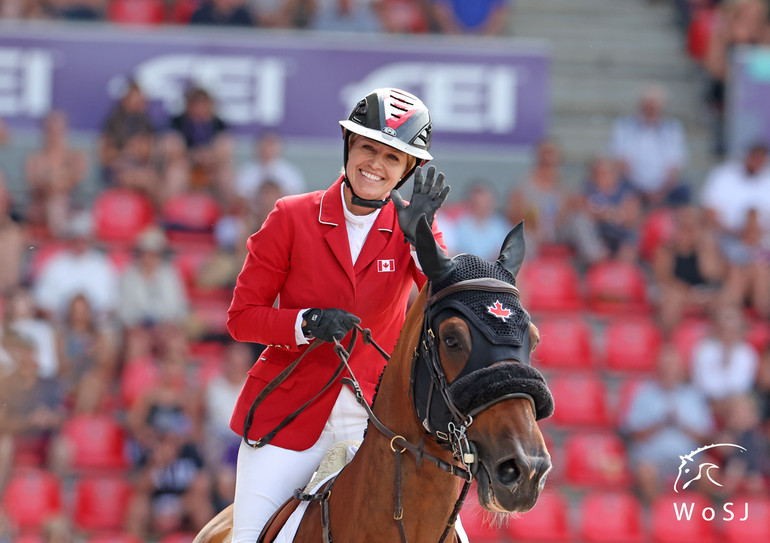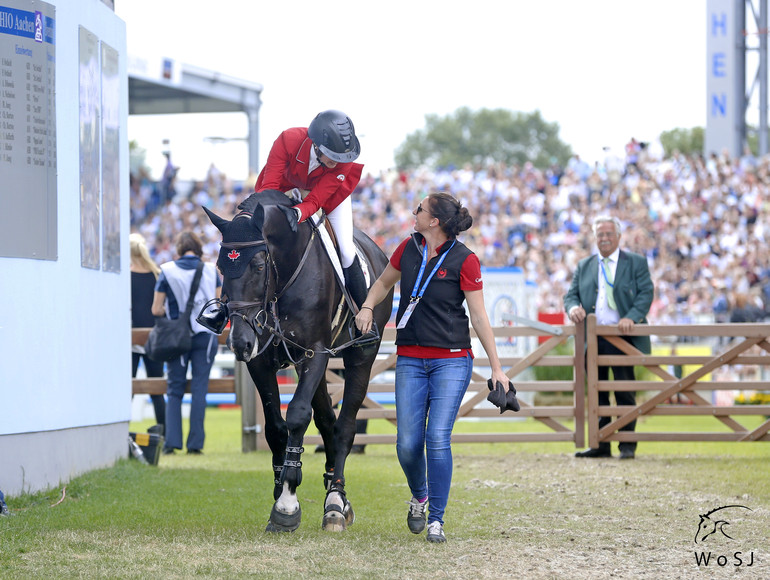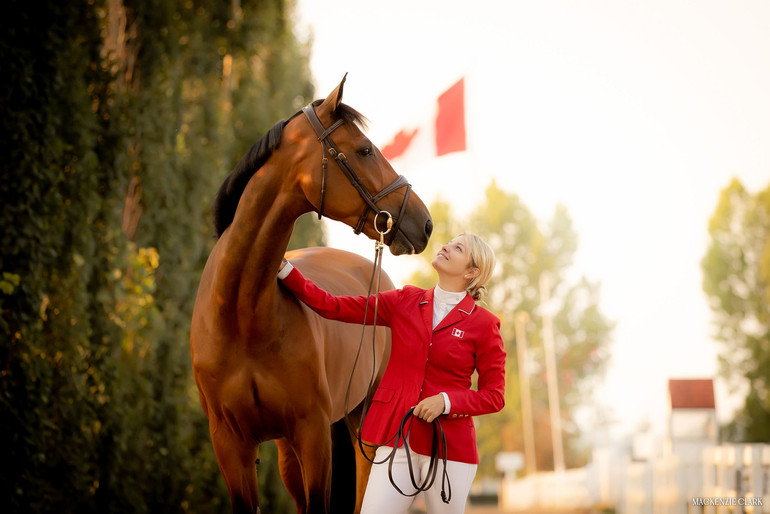Text © World of Showjumping
Tiffany Foster knows hard work. The 38-year-old Canadian, who started out as an intimidated 8-year-old at her local riding school, has – through determination and will – reached the top of the sport, going from being a local working student to become employed by Eric Lamaze, and from there she has built stone on stone to currently be the highest ranked female showjumper in the world. At the FEI Agria Jumping World Championship 2022 in Herning, Denmark, Foster placed 12th individually – the best Canadian result at a World Championship since 2010 – and a video of an emotional Foster went viral. “I am an expressive, emotional human,” Tiffany tells World of Showjumping. “Everyone who knows me, saw that video, and thought, ‘yeah, that is Tiff’ – that is what I am like.”
“The thing is; I should not be here,” Tiffany begins. “If you look at my life… I was a groom, a working student, a stall cleaner; I did the turn-out shifts to pay for a horse my family could not afford. I had these dreams about riding on the highest level, but the fact that I got here, it was not supposed to be. I am just so grateful that this is a possibility and a reality for me, and I am not taking this for granted.”
Always a worker
Tiffany was born in Vancouver, Western Canada, to a family that had nothing to do with horses – her father was a fireman, her mother worked at Canadian Airlines. Tiffany, however, loved horses. “My parents got me a rocking horse – Holly – for my first Christmas, and there is a video of me seeing it; that was it,” Tiffany laughs. “Early on, I wanted to take riding lessons, but at the riding school you had to be eight years old for that. I made my mom bring me there and just watch the lessons until I was old enough to take part. I was terrified for a long time though and for the first couple of years I don’t know why I kept going back; riding made me so nervous. However, I loved horses so much, I really wanted to learn how to ride.”
When Tiffany turned eleven, a riding school pony called Shamrock came around. “She really changed my life,” Tiffany tells. “Before her, I was really scared, but Shamrock made me forget all my fears. My dad bought her for me and my sister on my 11th birthday, without telling my mom. Shamrock was our first horse, one we could not really afford, but we loved her. She made a big difference for me, because she made riding so fun.”
After school, all summer, every holiday; whenever I had the chance, I was working
If you want to ride in Vancouver, there is an area just outside the city, where all the horses are: Langley, the home of Thunderbird Show Park. “We decided to move our pony out there, even if it was quite a drive,” Tiffany explains. “We were not great clients though, as we had no money. I remember a meeting with Brent and Laura Balisky – the trainers at Thunderbird – where my mum told them that she could afford about 300 dollars each month, and we were explained that this was not going to get me very far. However, I was offered a position as a working student, and began working for them when I was 13. After school, all summer, every holiday; whenever I had the chance, I was working.”
The right place at the right time
Tiffany believes that her whole career has been about being in the right place at the right time and creating good opportunities for herself. While Tiffany was at Langley mainly grooming and taking care of barn chores, Brent and Laura Balisky’s niece was doing most of the riding. However, the Baliskys were left with a huge group of horses and no rider when their niece made the decision to stop riding. “So, Brent – bless him – decided he was going to make me a rider,” Tiffany laughs. “He worked hard with me: I was not a natural talent. However, I feel like I have always been pretty sympathetic with the horses, so they all seemed to get along well with me – and I was willing to work hard. I did a lot of grooming, managed the barn and rode all the horses. I only did the hunters and equitation though, no jumpers, but I had a lot of horses to show. I was quite successful and did well in the equitation. I was very fortunate because Brent and Laura were willing to pay for me to go to all these shows; my parents could not afford it. I am very grateful to Brent and Laura for those opportunities.”
The idea that I one day would be standing in the international ring at Spruce Meadows was so far-fetched, it was not even within the realm of possibility
“When I was 20, I had to find a way to make four $5,000 installments over four years to try to purchase a horse from a breeder in Langley, so I decided to teach beginner riding lessons. I made $11 a lesson. The idea that I one day would be standing in the international ring at Spruce Meadows was so far-fetched, it was not even within the realm of possibility,” Tiffany smiles. “I worked my normal job from eight to five, then from five to nine I taught lessons to people who were learning how to trot, four times a week, in the freezing cold of Canada, just so I could make this money to pay for the horse we could not afford.”
Setbacks and support
At the age of 21, Tiffany had spent almost all of her life at Langley and felt it was time to try something new. “Eric Lamaze came out to show at Thunderbird and he offered me a job,” she recalls. “Eric had a big business of sales horses and even though I did not know how to ride a jumper, he was confident that we could figure it out. And once again; someone was willing to teach me. When I left to work for Eric, I had never jumped bigger than 1.20m. However, with Eric, you learn how to jump big really fast, because he makes you jump huge at home. Brent and Laura had taught me how to ride, now Eric taught me how to be a jumper rider. In 2008, Eric had gotten me a horse that I would be able to do some 1.40m classes with but then I had an accident at home and broke my back really badly.”
When I left to work for Eric, I had never jumped bigger than 1.20m
A burst fracture resulted in Tiffany still living with two rods, six screws, a plate and six clips in her spine that is fused from T2 to T10. “It was a bad wreck, I could not walk for a few weeks and not ride for six months,” Tiffany tells. “That was a big setback. I followed along to the Olympics in Hong Kong to watch Eric, and obviously those were amazing Games for Canada. The team won silver and Eric won individual gold, and I remember thinking when I was there; ‘One day, I am going to ride at one of these’. Which at that point was not realistic as I had never jumped a 1.40m and I was sitting there in a back brace. I remember telling a friend of mine: ‘I am going to ride at the next Olympics Games’ – and she went ‘umm champ, sure you are…’”
While it took Tiffany a year to get back into the ring after her accident, she spent the time out of the saddle teaching the Artisan Farms’ Ziegler-family. “Even though I was not riding, I was able to teach, so I spent more time with them,” Tiffany tells. “At that point Caitlin Ziegler was still young and jumping small, so I was able to train her, and I started teaching Andy Ziegler, her father, who had never ridden. This was a huge part of us building a relationship with them. By 2009, Andy said he would be happy to get me a nicer horse and support me. The relationship with Andy and Carlene has been the most unbelievable opportunity of my whole career. Meeting them was the major, pivotal moment for me; I had the opportunity to not only get the training from Eric, but also have the horses to go along with it. Andy, Carlene and Caitlin were very supportive of me and encouraged me, they got behind what I wanted to do and wanted to support me in my goals. It put me on a fast track; I had been late with getting experience and needed to get going if I wanted to set off for the goals I had.”
Time and patience
“I think everything in this sport takes time and patience, and you have to be willing to put the work in,” Tiffany continues. “I was so lucky to have Artisan Farms buy me these made-up horses that I was able to give a second career to after they already had a full career with someone else. Victor (Elmshorn x Grandeur), the horse I took to the London Olympics in 2012, was meant to be for Eric. However, they did not get along great, so I started riding him and ended up getting to keep him. I also had Southwind VDL (Baloubet du Rouet x Ahorn), and I did my 1.60m debut on him in 2011. I was planning to go as an extra Canadian to Calgary, just to compete as an individual. However, literally the day before we were flying there, Eric called and said he thought I had to ride the Nations Cup – there was no one else. It was my first time jumping a 1.60m, at the Spruce Meadows Masters, for Canada. It turned out to be a good experience; we came second and it was the only Nations Cup I ever got to jump together with Hickstead. Ian Millar was on the team as well, and while him and Eric definitely carried the team, I had one useful score. Ian and Eric really instilled in us that Nations Cups are important; that it is an honour to ride for your country. I hope that will be their legacy. I know Eric learned it from Ian, then he taught it to me, and I will carry that on to those I teach. Nations Cups are a priority and I hope we can keep that alive.”
The greatest equalizer
Tripple X (Namelus R x Catango Z) was another amazing horse for Tiffany, that took her to the Pan American Games in 2015 and to the Rio Olympics in 2016. With Verdi III (Hors La Loi II x Cantus), Tiffany jumped at the World Equestrian Games in Caen in 2014. “I was able to go to a bunch of championships on horses that gave me great experience,” she tells. “In 2012, we were really committed to coming to Europe and going to these shows to get better, so the Zieglers bought a beautiful farm in Belgium, which has been a wonderful base for us to work out of.”
Most people maybe have a cooler head about it; I can’t be cool even if I try
“Now, I have a group of horses that I have produced myself since they were young, and to see them through from seven years old to championship level and have them be able to perform, has been a goal for me. I wanted to get here on my own, with horses I made myself,” Tiffany says. “At the end of the day, to actually have a chance to medal, or win, at a championship, you have to do the work yourself. If you look at the top 50 in the world, you have a really mixed bag of how everybody got to where they are. The cool part is, that most of the stories are more like mine. The thing is, no matter what, the horse is the great equalizer. Nobody can pay for it to go well; you have to do the work, you have to ride well. This gives an opportunity to people like me. Every day, I am amazed and so grateful; how is this my life? I have been so lucky along the way, met so many wonderful people who have given me all of these opportunities. I am so grateful I get to do this. Most people maybe have a cooler head about it; I can’t be cool even if I try. How did I land all this? I think we are really lucky, and lucky to realize it.”
Figor
Artisan Farms acquired Figor, Tiffany’s ride for the FEI Jumping World Championship 2022, back in 2015, when the gelding was seven. “Back then, Artisan Farms decided that after a strong ten years of going at this, they were going to slow down. However, they wanted to do one more horse – one more championship type,” Tiffany recalls. “So, if I found one, they would be happy to buy that for me and then let the group ride out, for me to get other owners. I love riding Nations Cups and championships, and as a rider, I like to feel a lot of scope. Therefore, I thought that if I would get one more horse, I wanted to make sure it could jump really big – the rest I could figure out. I decided to watch the young horse finals in Aachen that year, because if a seven-year-old horse is jumping there, they can jump big – and that was priority number one for me. As I sat and watched, Figgy really stood out to me. I called Eric and asked his opinion, and he talked to Andreas Kreutzer who at that point was not sure if he wanted to sell. However, he was just starting his own business, so it made sense. I tried Figgy and felt he had monster scope, I just had to put some gears in.”
If Figgy’s mind is in the right place, he is unbelievable
“The most difficult part with Figgy is that he gets upset easily, he is a bit neurotic, a bit on edge,” Tiffany continues. “I remember when I tried him, it felt like I was riding him somewhere he had never been before. I asked Andreas two times; 'is this your barn, are we at your barn?' He was scared of the corners, it felt like he had never been there before! But that is just how he feels, all the time. When I first got him, I struggled with all of this frantic energy that he had. And he still has that, but now we know what sets him off.”
“In the beginning, Figgy was intimidating for me though, and Kent Farrington helped me with him. Kent has ridden him a lot on the flat, tried to help put some boundaries and guidelines in,” Tiffany explains. “When he was younger, Figgy’s results were up and down, because even though he is a really careful horse, his mind can take over and it is hard to keep him with you. Over the last two years, due to Covid and a small injury, Figgy actually did not show so much; he got time to mature and get older, and I think the down time helped a lot. He was just growing up, waiting to get ready for the jumps. Now, I feel the puzzle is coming together; we had a really good season last year. I always thought he was a championship horse and this year he got to prove that. I am really excited; this feels like only the beginning with him – I believe we got the formula right.”
“His groom Caroline Holmberg – who has been with him from day one – also plays an integral role in his success. His flat rider, Max Manzardo, is also very important – he usually has to deal with the Tuesday rides after a day off! If Figgy’s mind is in the right place, he is unbelievable: With all of his physical ability, the sky is the limit,” Tiffany says.
All-female team
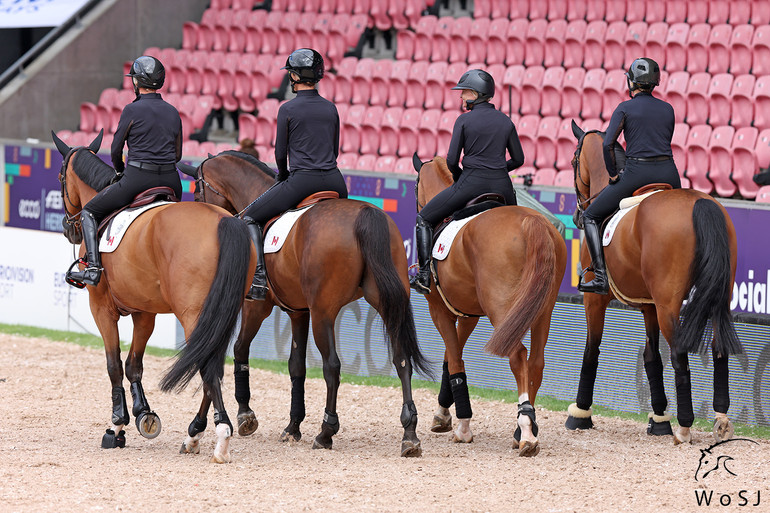
“I have so much respect and admiration for all of them, and we were a tight knit team. I love them so much, I was so happy to have them on the team and they made me better for it," Foster says about riding in an all-female Canadian team in Herning. Photo © Jenny Abrahamsson for World of Showjumping.
In Herning, Tiffany represented Canada alongside Beth Underhill, Erynn Ballard and Amy Millar. “I thought it was amazing,” she says about riding on a team of only women. “I have so much respect and admiration for all of them, and we were a tight knit team. I love them so much, I was so happy to have them on the team and they made me better for it. If you look at our sport, at a certain level there are more women than men, but then it starts to peter out. There are many reasons, but a big part of it is that at one point, women have to make a decision on whether or not they want to have a family. It is really hard to do both, especially because at the age when you actually start to get good in this sport, the window is closing to have a family. Women at the top of this sport have made a lot of sacrifices to get there, and it is hard: You have to be strong to do this. Furthermore, this is an individual sport and when you are in the ring, it is just you and your horse, but I do think that knowing you have a team behind you, and what it means for them, helps. For me, it is a huge motivator and I definitely do better when I know someone else is counting on me.”
Women at the top of this sport have made a lot of sacrifices to get there, and it is hard
“The last round of the championship; I have never been in a position to ride something like that,” Tiffany continues to tell about her experience in Herning. “The whole week, the courses were big and hard, but I had time to think and make my plan, know exactly how I wanted to ride. Then in the last round, every jump was at the top of the standards, the course was really hard, with only about ten minutes to walk. I walked the course and thought, ‘can horses do this?’ It was so big. And no one else seemed worried… For myself, my take away from this championship is that I need to find a way to stay focused, even if I don’t have so much time to get ready. In the past, I had attended these championships more as a participant than a real competitor. I’m sure when people saw me coming, they did not think ‘oh-oh, here comes Tiffany Foster!’ – I’m pretty sure that was not what was going through Henrik von Eckermann’s mind… But next time, maybe! I think this was the first time that I went and felt I could go fast on the first day. I know my horse could have gone clear in the last round as well, those were my faults. I need more experience in these pressured moments on this level.”
Number one woman
Currently, Tiffany is ranked 29th on the Longines Ranking, making her the highest ranked female rider in the world. Only two other women are ranked within the top 50, and only once has a woman topped the ranking – Meredith Michaels-Beerbaum. “As much as our sport is equal, it is not,” Tiffany says. “In this sport, it is so hard to get good and it takes so long. It has so much to do with your mental experience, how you cope with everything and how you learn. If you look at the best in the world, most are over thirty. Many riders peak in their careers around forty, which is way later than in most sports and that just gives you an indication of how much time we put into this. A professional career in showjumping is a full life consuming thing.”
As much as our sport is equal, it is not
“When I first started, Eric was a great coach and trainer, but he was not there to go through all of the mental aspects of it. It was like “it’s hard, get over it”. What I had to do, for myself, was to find a way to stay really positive on what I was doing and set attainable goals. So many times when you go into the ring, it is not to win a class – but if you don’t remember that, you can get lost in all of this and think that you are not doing well. Even if it is not a first place, it can still be a victory: A clear round, a first time jumping on grass, simply gaining experience… That is how I made myself feel better about the way things were going. I think it is a good exercise for any rider to do: Remember it is not always about winning a class. I set being the highest ranked woman as a goal for myself, because again, if our sport was so easy and equal, it would be five women and five men in the top ten. It is not that women don’t ride as well, it is just harder for us to get there, to have the support system, to do all the things you have to do and sacrifice all that you have to sacrifice to go to a show every weekend. For me this goal was a good benchmark to see where I am at – and it is not the end of my goals. Maybe the next goal is the top twenty, then the top ten… and maybe someday to be the number one in the world!”
Little Creek Equestrian
Today, Little Creek Equestrian is Tiffany’s business, while most of her horses are still owned by Artisan Farms. “Training is a big part of my business,” Tiffany tells. “I don’t have an assistant trainer, a husband or a boyfriend, or anyone helping, it is just me. You have to be organized to do it this way, take good care of your clients and make sure you are doing a good job for everybody. To balance it all is tricky; it would be a lot easier if I didn’t have to worry about anybody else, but that has never been my reality. My days are full, from seven to six most days. I am pretty hands on, I always was a worker; and when you are used to it, you just keep working. I like to do everything myself, and I guess that is maybe a fault of mine; I am not good in handing things over.”
My days are full, from seven to six most days. I am pretty hands on, I always was a worker
“This is a multifaceted industry,” Tiffany continues. “It is hard to compare ours to other sports, because they don’t have many of the aspects we need to deal with. Our most important asset is the horse. I have always worked really hard and all my horses have been owned by people I have a really good relationship with. As much as they like to watch their horse succeed, they have wanted to see me succeed, they have wanted to support me in what I do. I don’t think I have ever been a rider that would just attract an owner out of the blue.”
Tiffany’s groom Caroline Holmberg is an essential part of Artisan Farms and Little Creek Equestrian. “She has been with me for ten years,” Tiffany says about Caroline. “I have a really good team of people around me. I have so much respect for grooms and people who do that side of this business; it is so exhausting. I am so lucky to have found Caro and have her in my life. She loves the horses as much, or even more, than I do – they are her horses as much as they are mine and the Zieglers’. To have someone like her in my corner, who does all she can to make sure everything is perfect, is essential. She has so much enthusiasm and passion for the sport, not to mention her knowledge and experience. I trust her 110% and I think we have a really good relationship. I could not do this without her, and I tell her all the time. I hope that we will be doing something together even when we are old; I hope she will always be a part of my family and my team.”
All in
To be on the top of the sport, you have to go all in and Tiffany has no plans of slowing down. “I would like to go really hard for the next five years at least,” she tells about her plans for the future. “I have a great group of horses and great support behind me. I want to go to the Paris Olympics and probably Los Angeles would be another good goal. Going at this pace is very exhausting and you are never in one place for very long. I learned during Covid that going to a show every weekend is not necessarily better; sometimes you can just work your horses at home and give them time off. I will try to do more of that in my scheduling, but it doesn’t mean backing off. We are in the process of building a really nice facility in Langley with my wonderful friend and client Wendy Valdes so that I can base there a little bit more as well. I am really looking forward to having a base in Vancouver where I can maybe try to manage a better work-life balance. The plan is to develop my young horses there between Thunderbird and Spruce Meadows and obviously still come to Europe as well, but spend a bit more time in Canada. I am really looking forward to that; it is a big change for me and I hope I can make it all work.”
I love horses, I love being around them, I love being able to spend my days with them
“If you talk to anyone who knew me back when I first started, they are so proud, they can’t believe I did this, and I feel that way too,” Tiffany concludes. “I don’t take this life for granted. I am happy that I am doing this, that my horses are awesome, that all the work, effort and sacrifice have been worth it; that I have been doing it right. Over the years, I have really grown to love the development of horses and figuring them out. What I enjoy the most in the whole thing is the relationship with the horses. If I was not doing this as a job, I would still ride; I would want to spend all day with horses, I would be on a trail ride or brushing their manes. I love horses, I love being around them, I love being able to spend my days with them. Obviously, like with everything, there are some things that are not as fun as others, but it is still a cool and exciting way to make a living. It is so rewarding when it goes well; we put a lot of time and effort into it, and I figure when I have the support, the infrastructure and the horses, I may as well see how far I can go. I want to be able to look back at the end of it all, when I am retired and just brushing their manes, and think of all the fun things I got to do.”
No reproduction without written permission, copyright © World of Showjumping.com



